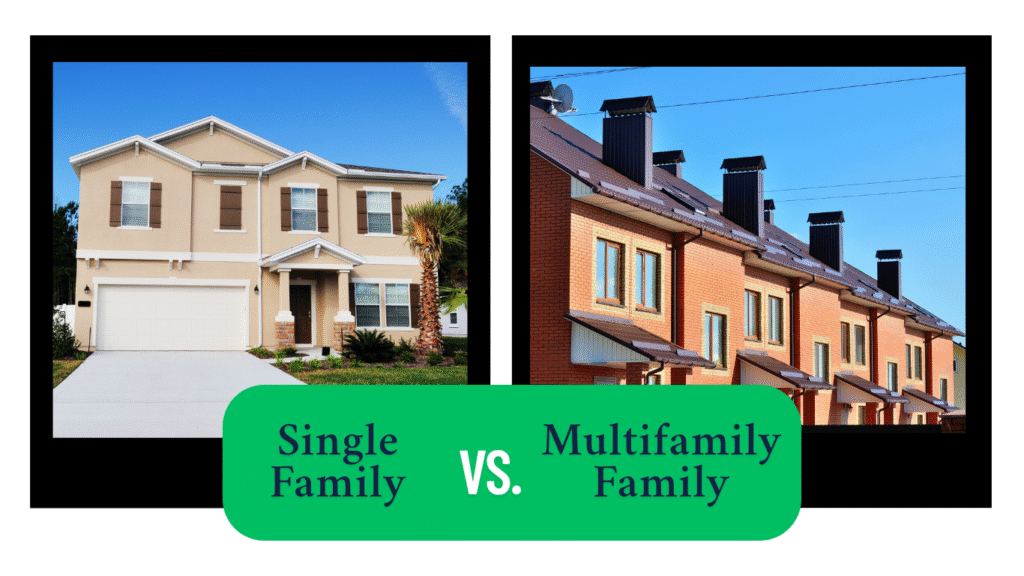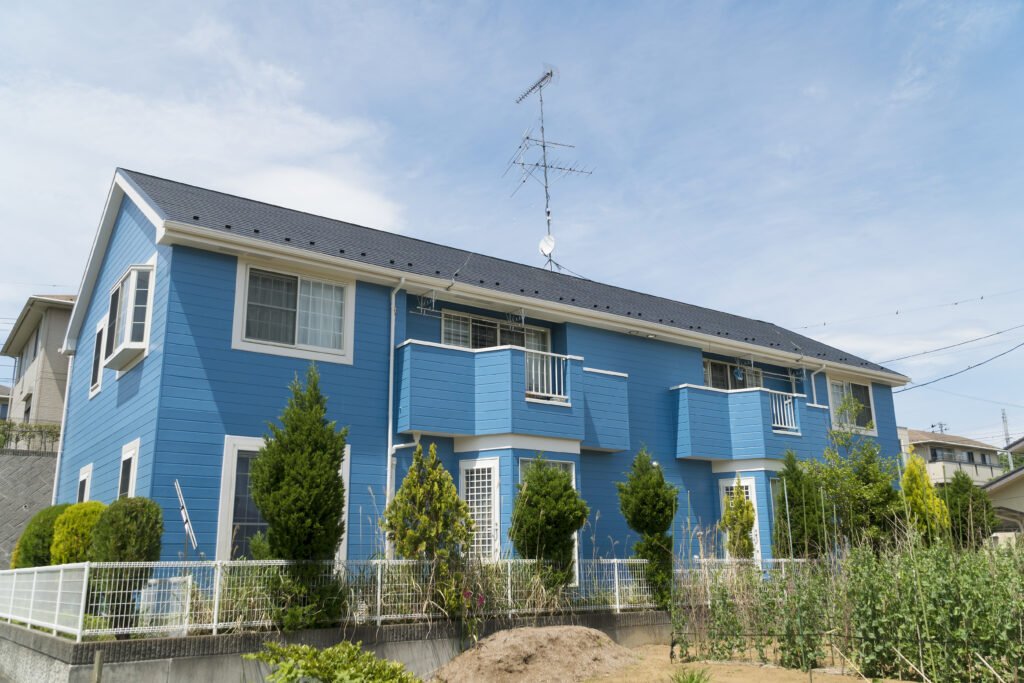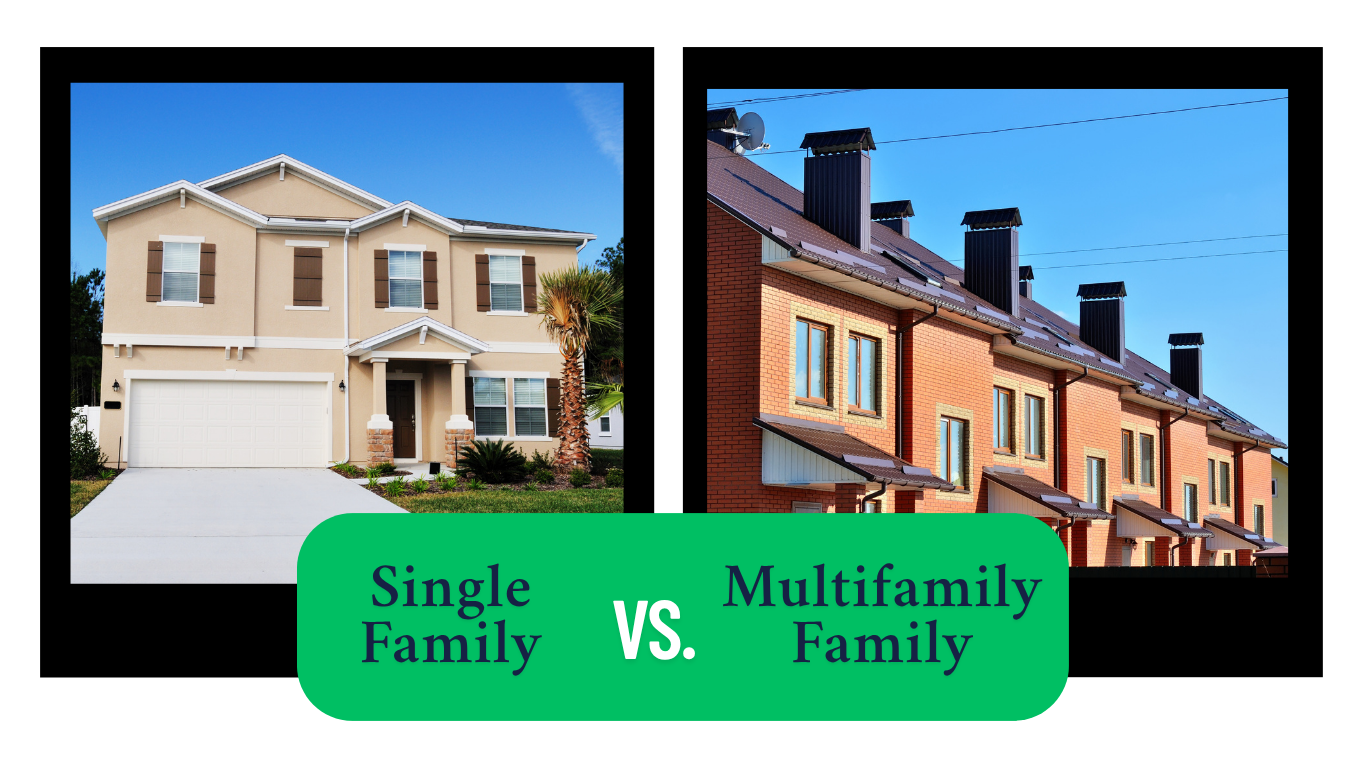When considering long-term investments, we often prioritize the potential cash flow. Investing in multifamily properties has clear benefits over single-family homes, since the buying process is similar for duplexes, triplexes, and fourplexes. Keep in mind that owning multiple rental units can offer more flexibility, potentially increasing rental income and cash flow compared to a single-family residence.
However, it is crucial to carefully consider both the benefits and drawbacks by focusing on several key aspects:

Economies of Scale
Managing multiple units together can lead to significant savings on maintenance, management, and utility costs, boosting your investment’s profitability.
Diversification
Investing in multifamily properties provides diversification by spreading your risk across multiple tenants, reducing the impact of vacancies or non-payment.
About Single-Family vs. Multifamily Real Estate
Let’s break down the advantages of investing in multifamily vs. single family homes, in order to start planning your real estate strategy.
- Which Investment is Right for You?
- What are the advantages and disadvantages of both?
What does residential category include?
The residential real estate category encompasses both single-family dwellings, duplexes, triplexes, and four-plexes.
- Single-family dwelling (one home)
- Two adjacent houses meant for different families.
- Triplex, also known as tree homes
- Four-plex, consisting of four homes.
Whether you’re interested in the potential value growth of single-family homes or the steady rental income of multifamily properties, this guide will help you explore the long-term advantages, tax effects, maintenance needs, and cash flow considerations for both types of investments.

This will be a clear and comprehensive strategy for selecting the type of property to prioritize for long-term investment:
1. Dive in to find out the main differences and which real estate option fits best with your financial growth goals:
Single-Family Homes
Single-family homes usually increase in value faster than duplexes, triplexes, and four-plexes because there are more people wanting to buy them, which makes them easier to sell. Also, during economic downturns, single-family homes tend to keep their value better than multifamily properties because they are seen as a safer investment.
Advantage in Selling: These properties offer a distinct advantage when it comes to selling, as they attract a broader pool of potential buyers, ranging from investors to individuals in search of a new home.
Market Stability: Single-family homes offer a higher degree of value stability when the market experiences downturns, as they are generally perceived as being less risky than multifamily properties.
Multifamily Properties
One of the benefits of investing in duplexes, triplexes, and four-plexes is the stability it offers in terms of income. With multiple units generating income, even if one unit is vacant, the cash flow remains steady.
Furthermore, these properties provide an excellent opportunity for scaling your real estate portfolio.
Acquiring a 4-unit property is often a faster and more cost-effective way to expand compared to purchasing four separate single-family homes.
Another advantage is the economies of scale that come with managing multifamily properties. By spreading the costs of maintenance and management across multiple units, it is possible to potentially lower the per-unit expenses.
Scalability: They provide a quicker solution to expanding your real estate portfolio, as purchasing a 4-unit property is frequently more efficient and economical than acquiring four individual single-family homes.
The concept of economies of scale allows for the distribution of maintenance and management costs across multiple units, leading to a potential reduction in per-unit costs.
2. Taxes
Single-Family Homes
Tax deductions allow you to lower your taxable income by deducting eligible expenses such as mortgage interest, property taxes, and specific rental-related costs.
You may qualify for a Capital Gains Exclusion if you have lived in the home for at least 2 out of the last 5 years, allowing you to exclude up to $250,000 ($500,000 for married couples) of capital gains from taxes when selling the property.
Multifamily Properties
Depreciation allows for a substantial reduction in taxable income by spreading the building’s cost over a period of 27.5 years.
Cost Segregation is a powerful strategy that enables property owners to accelerate the depreciation of specific elements of their property, resulting in substantial tax advantages.
Owners of multifamily properties can take advantage of the Qualified Business Income (QBI) deduction, which enables them to deduct up to 20% of their rental income under specific conditions.
3. Maintenance
Single-Family Homes
Reduced overall maintenance: Having just one tenant or family typically results in decreased wear and tear on the property.
Simplified Management: The management of a single tenant is easier and requires less time.
The per-unit costs of maintenance can be higher because it is not possible to divide the cost among several units.
Multifamily Properties
With an increase in the number of units, there comes a proportional rise in the maintenance demands and potential issues.
Larger properties may benefit from on-site management, as it can optimize operations, despite the additional costs involved.
Enhanced Cost Efficiency: By utilizing bulk servicing and taking advantage of economies of scale, maintenance costs per unit can be significantly reduced.
4. Cash Flow
Single-Family Homes
Variable Cash Flow: When the property remains unoccupied, it generates no revenue, resulting in an unreliable and unstable cash flow situation.
Single-family homes can generate higher rental income per unit as compared to individual units in a multifamily property.
Multifamily Properties
Duplexes, triplexes, and four-plexes generate multiple income streams, increasing the likelihood of collecting rent even if some units are vacant.
Rents per unit are generally lower in duplexes, triplexes, and four-plexes than in single-family homes.
General Pros and Cons
Single-Family Homes
Pros:
- Financing becomes more accessible with reduced interest rates.
- Has a higher appreciation potential.
- Has a larger buyers pool when selling.
Cons:
- Higher risk of vacancy impacting cash flow.
- Higher per-unit maintenance costs.
- Limited ability to scale quickly.
Multifamily Properties
Pros:
- Having multiple rental units ensures a more reliable and steady cash flow.
- Economies of scale in maintenance and management.
- Accelerated portfolio expansion.
Cons:
- Management that is both more intricate and requires a significant amount of time.
- Higher entry cost and more complicated financing.
- Single-family homes may have the potential for lower appreciation rates in comparison.
Conclusion
Deciding whether to invest in single-family homes or multifamily properties depends on your investment goals, willingness to take risks, and how you prefer to manage your investments. Single-family homes are easier to manage and tend to increase in value, making them a good choice for investors looking for stability and the option to sell easily.
On the other hand, duplexes, triplexes, and four-plexes provide a more consistent cash flow, the potential for growth, and tax benefits, which make them attractive to investors looking to build a substantial portfolio and generate a steady income.
One advantage is the potential for higher cash flow due to multiple rental units generating rental income. Another advantage is the potential for cost savings in maintenance, management, and utilities, as these costs can be spread across multiple units in a multifamily property. Investing in duplexes, triplexes, and four-plexes properties also provides diversification, as the risk is spread across multiple tenants. Additionally, multifamily properties located in high-demand areas have the potential for faster appreciation compared to single-family homes.
Overall, the decision between investing in duplexes, triplexes, and four-plexes or a single-family home depends on individual financial goals and risk tolerance.
In an upcoming post, we will explore the various ways you can leverage duplexes, triplexes, and four-plexes for house hacking and maximize its advantages.
Contact me to set goals, budget, and start the journey to financial success!

Join The Real Estate Ally Newletter today.
1 comment on “Advantages of Investing in Multifamily vs. Single Family”